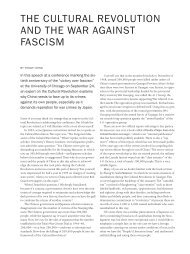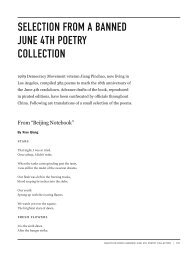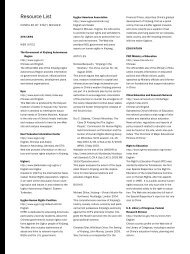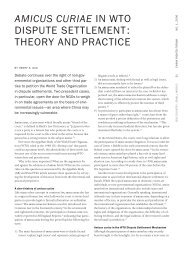STATE SECRETS: CHINA'S LEGAL LABYRINTH - HRIC
STATE SECRETS: CHINA'S LEGAL LABYRINTH - HRIC
STATE SECRETS: CHINA'S LEGAL LABYRINTH - HRIC
You also want an ePaper? Increase the reach of your titles
YUMPU automatically turns print PDFs into web optimized ePapers that Google loves.
CASE STORY<br />
Tohti Tunyaz<br />
8 HUMAN RIGHTS IN CHINA <strong>STATE</strong> <strong>SECRETS</strong>: CHINA’S <strong>LEGAL</strong> <strong>LABYRINTH</strong><br />
Tohti Tunyaz (图尼亚孜), an ethnic Uyghur, was arrested on February 6, 1998<br />
after returning to China to collect research materials for his Ph.D. thesis. Tunyaz,<br />
who wrote under the pen-name Tohti Muzart, enrolled at the University of<br />
Tokyo’s graduate school in 1995 and was preparing a thesis about China’s policies<br />
toward the country’s ethnic minorities. He was charged with “illegally<br />
procuring state secrets” and sentenced to five years in prison, plus seven years<br />
for “inciting splittism,” with a combined sentence of 11 years’ imprisonment.<br />
Reportedly, the documents in question were historical records from 50 years<br />
ago that he obtained from a library worker and photocopied. On the latter<br />
charge, he allegedly published a book in Japan in 1998 entitled The Inside Story<br />
of the Silk Road. According to the Chinese government, the book advocates ethnic<br />
separation, but neither the book nor its manuscript was submitted to the<br />
court, one source says. Furthermore, Tunyaz’s supervisor, Professor Sato Tugitaka<br />
at the University of Tokyo, claims that this book simply does not exist. 19<br />
Tunyaz appealed to the Xinjiang Uyghur Autonomous Region (XUAR)<br />
Higher People’s Court, which upheld his sentence of 11 years’ imprisonment<br />
with two years’ subsequent deprivation of political rights on February 15,<br />
2000. However, the Higher Court later amended the charge from stealing<br />
state secrets to illegally acquiring them. He is being held at Urumqi No. 3<br />
Prison in the XUAR and is due for release on February 10, 2009.<br />
In May 2001, the UN Working Group on Arbitrary Detention concluded that<br />
his imprisonment was arbitrary and in violation of his rights to freedom of<br />
thought, expression and opinion. Successive presidents of the University of<br />
Tokyo have written letters to Chinese leaders to ask for Tunyaz’s release, saying<br />
that, for example, “Tohti was critical of the independence movement. He<br />
did not plan to publish a book. His arrest is based on misunderstandings.” On<br />
November 29, 2005, he was visited by the UN Special Rapporteur on Torture<br />
and Other Cruel, Inhuman, or Degrading Treatment or Punishment, Manfred<br />
Nowak, during his mission to China between November 20 and December 2,<br />
2005. Tunyaz told the Special Rapporteur<br />
that he had been held in a pretrial<br />
detention facility for more than two<br />
years. He was put in a solitary confinement<br />
cell, interrogated daily and was<br />
unable to communicate with his family. 20<br />
Tohti Tunyaz







